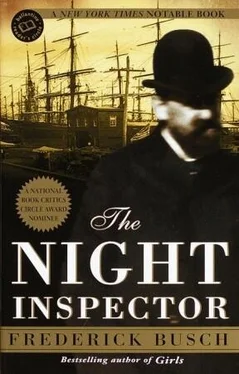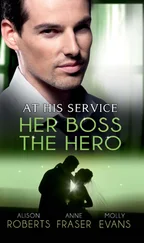Finally, though, I rubbed my hands on the smoothly beautiful wooden butt; the oil from my fingers, over years, had permeated it, and I was rubbing upon myself, a peculiar kind of friction, yet something that gave me pleasure. It was a touching upon my own history. I had touched the pistol in difficult moments — when a detachment of Rebel horse came so close to our camp, so swiftly, that I was the only one armed, sitting with my buttocks hanging off a log of downed birch, caught in mid-stooling, my pistol in my hand, the defender of us all. Even while they paused, and while I prayed that my unfelicitous scent might not betray us, and while I squeezed the darkened walnut grip, I had my left hand to my mouth that I might smother my helpless giggling. It was a work of art, that revolver, and the falling to of the mechanism that brought the next chamber up was a smooth, heavy, inevitable motion. I would sell him my past for a song, then. Four dollars was a decent amount of money for a man who was slave to his wages; it was nothing to me for the Colt. Yet it could be much, and what men such as I were expert at was knowing when to invest, and with whom. Look at the Crédit Mobilier: I had every conviction that the railroad it protected would go bust; I had every confidence that the credit corporation itself would make fortunes for its investors. Men would go to prison, I thought, and men would go to the bank; I needed no compass to tell my own direction.
I put the pistol and some old brushes and a small bottle of gun oil wrapped in cloth inside a croker sack. In honor of our night on the harbor when the shipment of brandy came through, I carried a bottle of something older than I from the Continent, for I knew he liked his tot. I put on my good coat, and then my damned mask, and left, bearing gifts.
I found a cabriolet at Canal Street and had him carry me up Broadway. Even at that hour, verging on seven-thirty, Broadway was bright with light and noisy with prostitutes cackling about like geese. You cannot imagine how, in those days of accelerating growth of the city, the whores were everywhere, and particularly on Broadway. The men in city government who had a share in their care, feeding, and occasional policing were in a business as good as any I knew. I did not venture it myself because of Jessie; you may believe it as you will, but I had certain limits and a few proprieties, although I would not describe myself as being a man of much conscience. Thinking of my hands upon the pistol, and of my days in the War, I had thought that I survived the sniping as long as I did because of my age. I was no nimble boy when I did service. I had entered, in 1861, at twenty-six; I had been discovered as a marksman late in 1862, and I had survived into 1864. Almost thirty years old, then, when I was skipping in the tops of trees and killing men in numbers with a gun. You cannot discount experience, and the sense, which a man will have but not a boy, of what he can and cannot achieve, whether on the ground and peaceful, or in the trees and an Angel of Death. My host of the night was, I realized, nearly old enough to be my father if my father had gone a-pollinating at the age of sixteen. And here he was, with a boy of eighteen and three other children, and his various relations — according to a sodden night’s complaint — moving in and out of the house as if Elizabeth, his wife, were a professional cook.
“Lumpy,” he had confessed in a theatrical whisper, leaning across the tavern table and making a humorous face that, as usual, did not include any expression whatsoever of the eyes. He had laughed his silent, broad mouthful of shadows, and had repeated himself: “Lumpy. Lumps in the gravy, lumps hard as gristle in the very squash and beans, much less potatoes, and lumps in the rice pudding bigger than the currants themselves. She is a resolute and dangerous cook, my patient Lizzie.”
No matter his joking, I thought, this was a man as given to the miseries as I was. You could look into my dead face and find my living eyes. In his case, the life and death were reversed, and the flesh of his face was living ground, while his eyes were little monuments to lifelessness buried therein.
He greeted me himself at the doors at the top of the outside stairs. “Shipmate,” he said, holding his glass lantern aloft as if we were on a moving deck.
We shook hands, and then I presented the croker sack. “The aforementioned weapon,” I said, “in case you did not wish it to be table talk. As for the payment: four dollars, as and when convenient.”
He nodded, more acknowledgment than thanks, I thought, and then he surprised me. In his foyer, the shadows shifting as the lantern moved in his hand, he said nothing about my courtesies or his gratitude. Instead, hefting the sack, he asked, “Are there bullets?”
“Five in the chambers.”
“It holds five?”
“Six, but I am, like many, overly careful with something so dangerous. The hammer is somehow caught, the trigger — it is delicate, you must tell your son — may be tripped, and then someone is maimed, or dead, or anyway frightened half to death. I recommend the five, though it is up to your boy.”
“Mal.”
“And this,” I said, “is something for the end of the night, not that I wish to hurry its coming.”
“Let’s attend its beginning,” he said, leading me past an interior staircase and along a narrow corridor toward what he described as the dining room. It was a very small and dark place that once might have been the bedroom of a servant, I thought. Standing at the foot of the table was Elizabeth, his wife, her face a little plain and pug, her figure stout, her hands red, her eyes as lively and expressive as his were not. She winced at the sight of my mask, and her eyes slid away; I watched her direct them back. Her dress, of dark blue, had an oval white apron atop it, and she had the appearance, thus, of a serving maid in uniform.
“Stanny has eaten,” she said of their younger son, “and the girls are with relations for the week. So it is to be the four of us. This is Malcolm, sir”—the boy I had seen at Mrs. Hess’s, broad of shoulder and spotty of skin, with angry eyes as mobile as his mother’s and with his father’s fine features—“and I understand that we are indebted to you for his equippage.”
And so we sat down to dine. I turned from them to replace the mask with the dark silk veil, and they dealt as well with it as any. I set the mask on the broad planking of the dining room floor, at the edge of the braided rug, and when I looked down, it looked up at me. M gestured at it from his place at the head of the table, to my left, and he said, “Hawthorne wrote a tale about a skeleton and skull at the dinner table. Do you know it? It shook me, I recall.”
“Do you liken me,” I asked, “to the skeleton or skull?”
He held his spoon aloft and tilted his head to laugh the silent laugh.
“You do not hold it against your companions,” Elizabeth said, “that they speak of your … misfortune.”
“It makes the dining simpler, ma’am. Since the management of food beneath this veil, especially liquids, is no easy matter. People see what they see. They might as well say it.”
“You’re a hero,” Malcolm said.
“Oh, no, sir. I was a military man and I suffered the consequences thereof.”
“Not everyone did what you did. Father said you were a marksman!”
“Not everyone was,” I allowed.
“I’m for the cavalry,” Malcolm said. He seemed less thick and stupid than at Mrs. Hess’s. It was his eagerness that worried me: Be a soldier reluctantly, I thought, and live awhile.
M brought the croker sack up and made a great sound with it against the dining table.
“Oh, no,” Elizabeth said.
“Oh, a week’s wages,” her husband said, rather loudly.
Читать дальше












